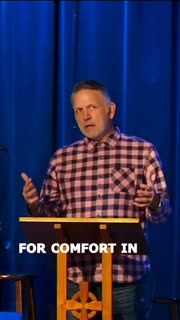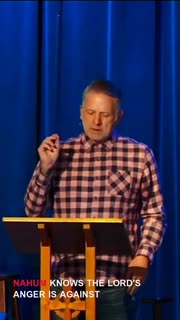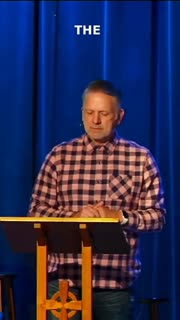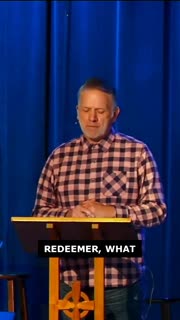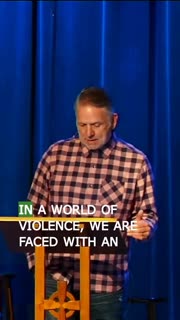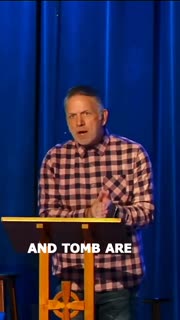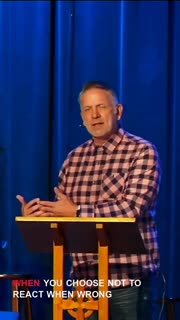Finding Refuge in God's Justice and Protection
Devotional
Sermon Summary
Bible Study Guide
Sermon Clips
1. "Where do we go for comfort in a world of evil and violence? Where do we go? That's the question that the people are dealing with in Nahum's day. Now, Nahum was a little... He was a little-known prophet. He lived about a hundred years after Jonah. It's the reason why I paired these two together, even though it's a much later minor prophet by date. Jonah's kind of the A-side, and Nahum's kind of the B-side." [36:37] (31 seconds)
2. "Nahum knows the Lord's anger is against Nineveh. And though he is slow to anger, he is great in power. His ways are the whirlwind and the storm and the cloud and the dust of the sea. This God, this warrior God is fearsome. But he's good. Like Lewis's tale in the Chronicles of Narnia where Lucy, curious about Aslan, asked about the lion to Mr. Beaver. Oh, Mr. Beaver, is he safe? Oh no, Lucy, Mr. Beaver replies. He's not safe, but he's good." [46:32] (34 seconds)
3. "The second thing you should know about this divine warrior and his goodness is he knows those who take refuge in him. He knows those who rely upon him for sustenance and guidance, life and love. This knowledge, this word know, is more than mere acquaintance. It's intimate care, tender concern, loving communion. God knows us. And he still loves us." [47:21] (29 seconds)
4. "Redeemer, what are your thoughts about God's judgment, divine judgment? I think if we're honest, it can kind of goad us. Sometimes it's like that. We have a lot of these things called goat heads in New Mexico. It kind of pricks your skin. It makes you unsettled. It hurts. Why is that? We don't seem to have a problem with a God who is loving, who supports us, who is the lee side of the stone when there's trouble for us. But the idea of a God who executes justice through judgment on people, not as much." [48:12] (47 seconds)
5. "In a world of violence, we are faced with an inescapable alternative, either God's violence or human violence. Most people who insist on God's non-violence cannot resist using violence for themselves. They deem the talk of God's judgment a reverence, but think nothing of entrusting judgment into human hands, persuading God to do it. God's judgment is not unworthy of God's judgment. He's not persuaded, presumably, that this is less dangerous and more humane than to believe in a God who judges." [53:00] (36 seconds)
6. "Whenever you want blood, like some of you in this room have suffered, or your children have suffered, or family has suffered unspeakable things. You've been mistreated. You've been misjudged. People have conspired against you. You have enemies. What does Nahum say to you this morning as a word of comfort? What Our God is the destroyer of wrong. Our God is the destroyer of corruption. Against all thought of human vengeance, human pursuit of evildoers, Nahum emphasizes the avenger is the Lord. The avenger is the Lord. The avenger is the Lord." [55:51] (53 seconds)
7. "Jesus' cross and tomb are the lee of the stone. Jesus is our shelter in a world of violence and in the face of God's judgment because though sinless, righteous, and good, he willingly subjected himself, to our injustice, perpetrated by his own people and the Roman state, dying on a cross. He took on our sin and God's righteous justice against sin in dying on that cross and being placed in an actual rock, a tomb. Jesus is the lee of the stone." [59:15] (35 seconds)
8. "When you choose not to react when wrong has been done to you because of Jesus, you are running to the lee of the stone. When you choose to sacrifice and lay down your life, you are doing exactly what Jesus did. For He knows you and loves you. You're casting yourself on His patient mercy. You're casting yourself on the future hope that He will do away and He will judge all those powers that have stood against you. The Lord is our stronghold in our times of trouble. He is the lee of the stone." [01:00:40] (45 seconds)
9. "Jesus says, bloody ones, your endless cruelties enrage me, so I myself will be your end. I will make your grave my own grave. Jesus' death undoes even Oppenheimer's death. He is coming into the world to eradicate the world of evil. He is restoring all that's broken. He's doing that because He was broken to make the world whole again. He became sin to free us from our sin. He calls us to follow Him and bring life into the world. A life won by the divine warrior Himself. And we look to Him, trusting that all evil will give way to His justice and mercy because He's our Savior." [01:02:07] (49 seconds)
Ask a question about this sermon
2. "Nahum knows the Lord's anger is against Nineveh. And though he is slow to anger, he is great in power. His ways are the whirlwind and the storm and the cloud and the dust of the sea. This God, this warrior God is fearsome. But he's good. Like Lewis's tale in the Chronicles of Narnia where Lucy, curious about Aslan, asked about the lion to Mr. Beaver. Oh, Mr. Beaver, is he safe? Oh no, Lucy, Mr. Beaver replies. He's not safe, but he's good." [46:32] (34 seconds)
3. "The second thing you should know about this divine warrior and his goodness is he knows those who take refuge in him. He knows those who rely upon him for sustenance and guidance, life and love. This knowledge, this word know, is more than mere acquaintance. It's intimate care, tender concern, loving communion. God knows us. And he still loves us." [47:21] (29 seconds)
4. "Redeemer, what are your thoughts about God's judgment, divine judgment? I think if we're honest, it can kind of goad us. Sometimes it's like that. We have a lot of these things called goat heads in New Mexico. It kind of pricks your skin. It makes you unsettled. It hurts. Why is that? We don't seem to have a problem with a God who is loving, who supports us, who is the lee side of the stone when there's trouble for us. But the idea of a God who executes justice through judgment on people, not as much." [48:12] (47 seconds)
5. "In a world of violence, we are faced with an inescapable alternative, either God's violence or human violence. Most people who insist on God's non-violence cannot resist using violence for themselves. They deem the talk of God's judgment a reverence, but think nothing of entrusting judgment into human hands, persuading God to do it. God's judgment is not unworthy of God's judgment. He's not persuaded, presumably, that this is less dangerous and more humane than to believe in a God who judges." [53:00] (36 seconds)
6. "Whenever you want blood, like some of you in this room have suffered, or your children have suffered, or family has suffered unspeakable things. You've been mistreated. You've been misjudged. People have conspired against you. You have enemies. What does Nahum say to you this morning as a word of comfort? What Our God is the destroyer of wrong. Our God is the destroyer of corruption. Against all thought of human vengeance, human pursuit of evildoers, Nahum emphasizes the avenger is the Lord. The avenger is the Lord. The avenger is the Lord." [55:51] (53 seconds)
7. "Jesus' cross and tomb are the lee of the stone. Jesus is our shelter in a world of violence and in the face of God's judgment because though sinless, righteous, and good, he willingly subjected himself, to our injustice, perpetrated by his own people and the Roman state, dying on a cross. He took on our sin and God's righteous justice against sin in dying on that cross and being placed in an actual rock, a tomb. Jesus is the lee of the stone." [59:15] (35 seconds)
8. "When you choose not to react when wrong has been done to you because of Jesus, you are running to the lee of the stone. When you choose to sacrifice and lay down your life, you are doing exactly what Jesus did. For He knows you and loves you. You're casting yourself on His patient mercy. You're casting yourself on the future hope that He will do away and He will judge all those powers that have stood against you. The Lord is our stronghold in our times of trouble. He is the lee of the stone." [01:00:40] (45 seconds)
9. "Jesus says, bloody ones, your endless cruelties enrage me, so I myself will be your end. I will make your grave my own grave. Jesus' death undoes even Oppenheimer's death. He is coming into the world to eradicate the world of evil. He is restoring all that's broken. He's doing that because He was broken to make the world whole again. He became sin to free us from our sin. He calls us to follow Him and bring life into the world. A life won by the divine warrior Himself. And we look to Him, trusting that all evil will give way to His justice and mercy because He's our Savior." [01:02:07] (49 seconds)
